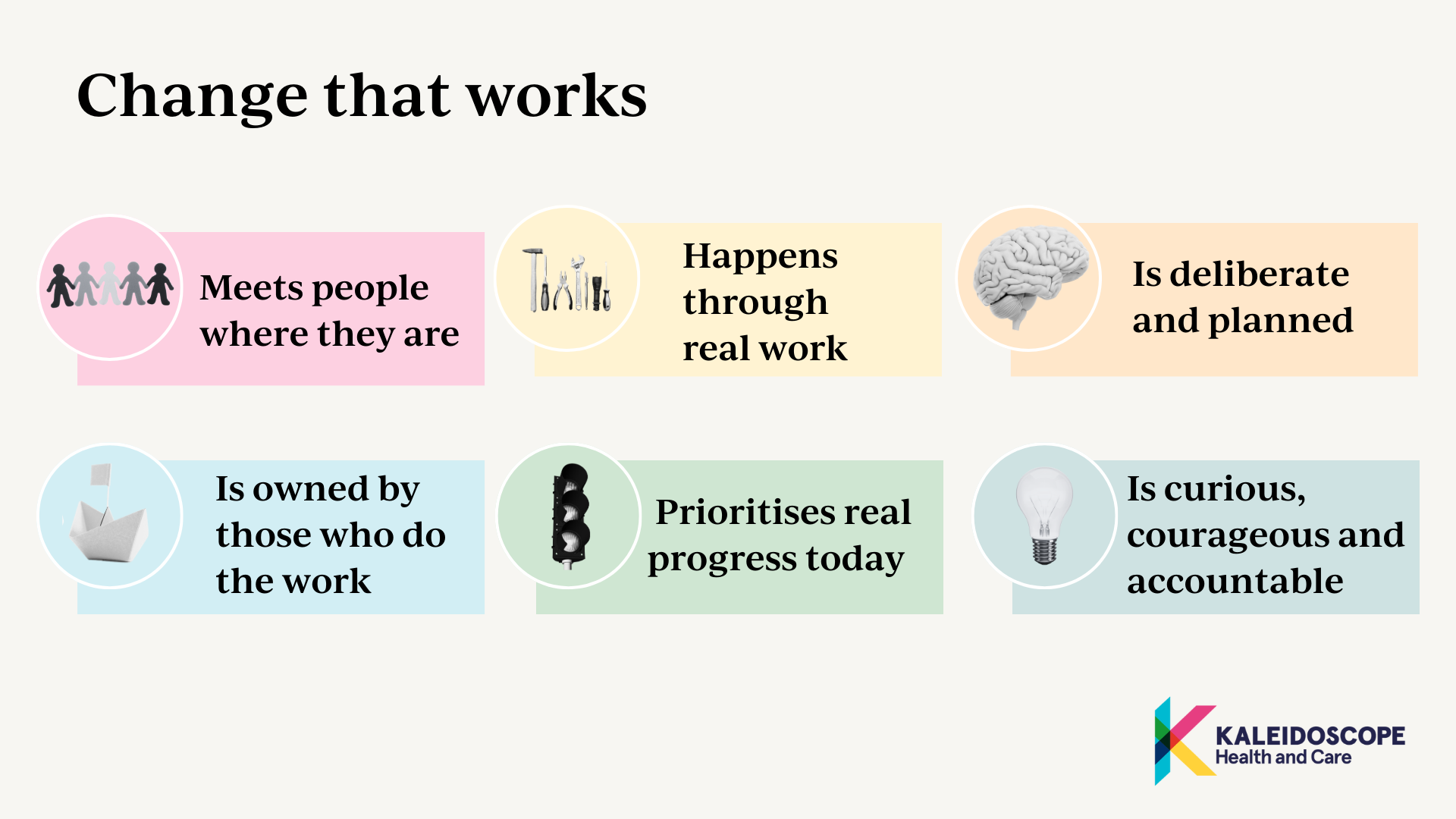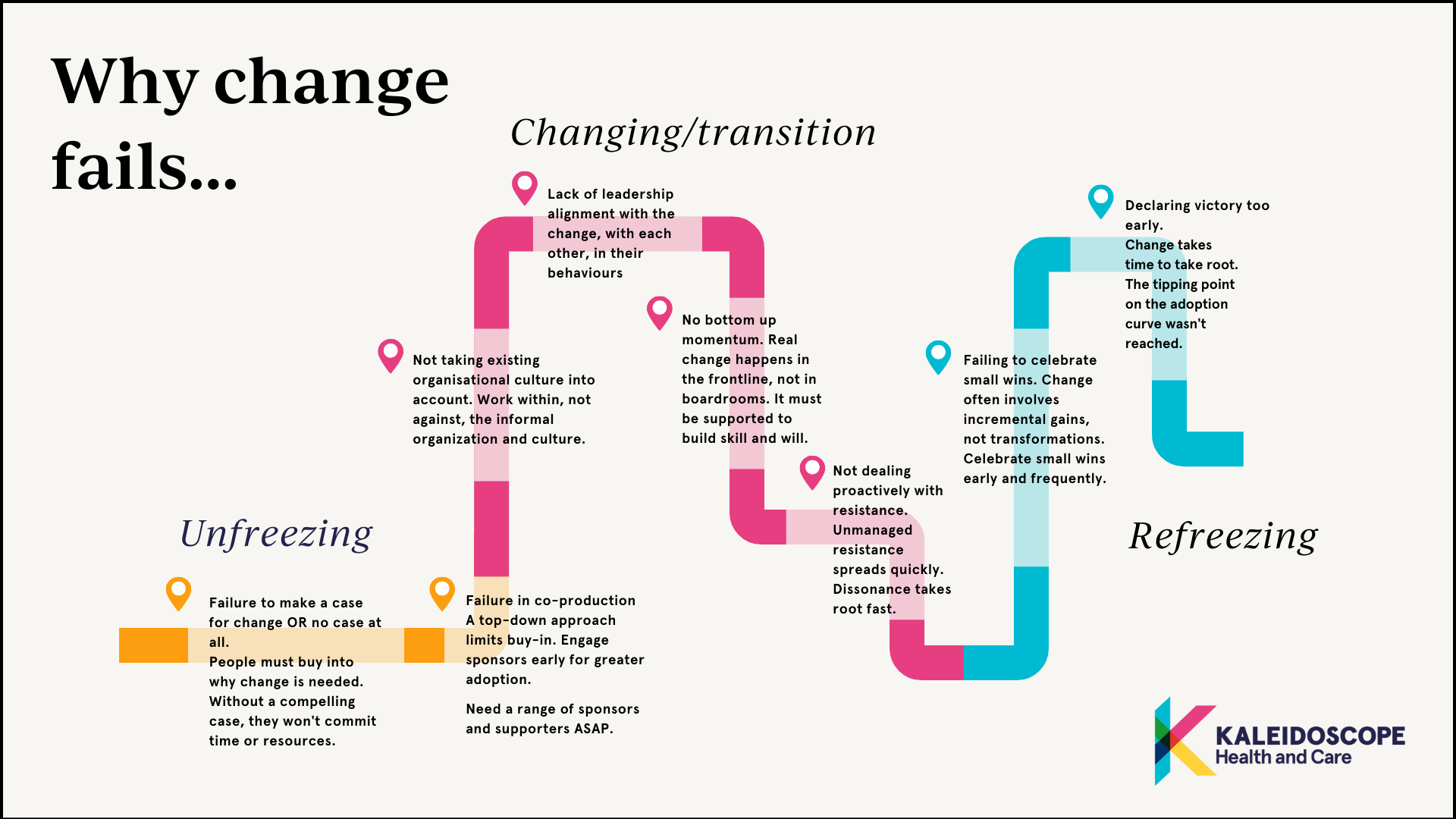Change is constant but change that works is optional
Some 70% of change initiatives fail. So what makes the difference and how do you apply this to healthcare? With experience of supporting more than 100 organisations, we’ve come to focus on six principles.
“History?” asks a character in Alan Bennett’s History Boys. “It’s just one f**king thing after another.” How change happens in healthcare proves the point.
Schizophrenia in the 1800s? Spin in a chair until you’re sick. Arthritis in 1900? Handy dose of radium will set you right. Heart attack in the 1970s? As David Haslam recounts in Side Effects, bed rest for three weeks, and no, you can’t pop to the loo.
Healthcare (fortunately) is always changing. This process of change is core to all we do at Kaleidoscope – whether that’s about strategy, partnerships, organisational development, service change, or evaluation. While change is constant, whether it works is optional; it’s not by accident that 70% of change initiatives fail.
So what makes the difference? And how do you apply this to healthcare in 2023? Drawn from the extensive literature (particular headnod to Edgar Shein, Myron Rogers, and Richard Rumelt, among others), our team’s personal history of decades working across health and care, and our Kaleidoscope experience of supporting well over 100 organisations, we’ve come to focus on six principles.
Meets people where they are
It helps people collaborate with others to find answers that fit their unique context. It builds from previous experiences of change, including fear or loss.
Our work starts by seeking to understand the lived reality of those whom the change will affect. For example, in our award-winning support for GP practices in Cambridgeshire to take a digital-first approach to diabetes care, our work focused not on the technical specs of different apps but the day-to-day challenges of those working in highly-pressurised environments and what patients actually needed to support them in managing their long term condition. This helped them change in a way which removed the ‘stones in their shoes’.
Owned by those who do the work
It is not imposed from the outside or from above. People are integral to the design and leadership of the approach.
Healthcare is as much a people business as it’s possible to be. It’s not just about involving staff in the process of change, but finding ways to share leadership from the very start. For example, our work in supporting system leadership with South East London ICS is led by a multi-disciplinary representative group using principles drawn from deliberative democracy.
Happens through real work
It doesn’t happen separate from the day job or via abstract thinking. And it can start in any work, at any time.
Real change happens on the front line, in the nitty gritty of the day job, not round the board table, the conference room, or within the pages of a glossy pdf. For example, our work with NHS England in spreading good practice from the Healthy New Towns programme focused on how areas could translate national learning into the reality of their every day.
Prioritises progress today
Lasting change happens through multiple new behaviours repeated over time, rather than through overnight transformation.
The lure of magical change which painlessly solves all our problems is beguiling, but false. Instead, our work focuses on finding hope in the power of incremental change, based upon a firm rock of shared purpose. For example, in our work building capability with Macmillan, we supported change across eight characteristics of high-performing teams, homing in on the ‘micro-actions’ which cumulatively add up to significant change.
Deliberate and planned
It draws on evidence and human, organisational and systems psychology to succeed. Change is complex – a systematic approach means nothing is left to chance.
Change needs time and patience. But it also requires a broad set of skills – whether that’s methodologies to support partnership working, evaluative approaches to track impact, understanding of organisational dynamics, or robust programme management to keep everything on track. For example, our support in helping the North London Mental Health Partnership be a great place to work fused strategy and organisational development – all within a context of developing new collaborative behaviours.
Requires curiosity, courage and accountability
It combines high psychological safety and high standards for a culture of continuous improvement.
Just why is change so hard, and what leads to failure? Our review of the literature shows a host of reasons, almost entirely cultural.
Any process of change which doesn’t seek to positively impact on culture (rather than see it as a negative force) will never flourish. For example, in supporting strategy development with Oxleas NHS FT we focused on the process of strategic change equally being a driver of cultural change, role-modelling the behaviours and ways of working they wanted their future to include. Healthcare change will never stop. We have no magic wand at Kaleidoscope. But if our combination of expertise, experience, and values could help you make change for the better, better, let’s talk. After all, good conversation is where all successful change starts.
* Many thanks to my amazing colleague Clare Allcock for her thoughts and suggestions on this blog.
Join us for an online event on delivering change that really works. ‘The transformation trap?’ is on 30 November. Find our more and sign up.




Comments